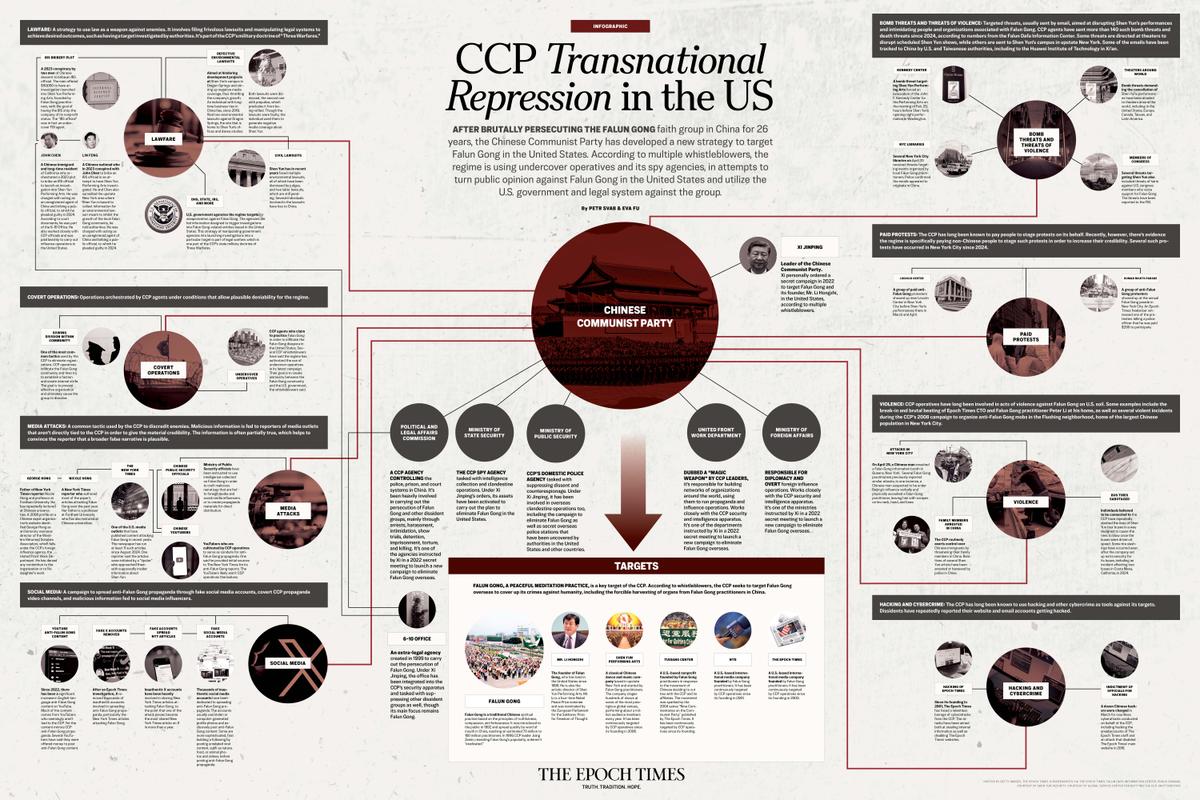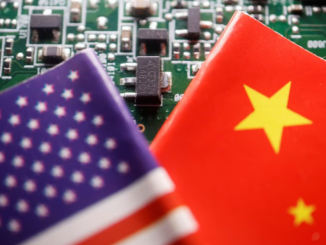
| Published June 11, 2025
The Chinese regime is engaged in a long-term campaign to target the spiritual group Falun Gong in the United States.
A growing body of investigative reports, legal cases, and intelligence briefings points to a coordinated campaign by the Chinese Communist Party (CCP) to silence, monitor, and intimidate dissidents living abroad, particularly those in the United States. These operations—part of what experts call transnational repression—are alleged to involve a blend of cyber surveillance, coercion, covert agents, and pressure tactics targeting Chinese nationals, including pro-democracy activists, Falun Gong practitioners, Uyghur Muslims, Tibetans, and Hong Kong exiles.
The tactics being used represent a shift in how authoritarian regimes project power globally, extending state control beyond national borders and into Western democracies. U.S. authorities have recently intensified efforts to expose and prosecute individuals involved in these overseas influence campaigns.
What’s Happening
The Chinese regime is accused of executing a systematic strategy to track, threaten, and suppress voices critical of the CCP, even when those individuals reside legally in the United States. This includes:
-
Online harassment and surveillance
-
Intimidation of family members still in China
-
Hiring private investigators or undercover agents
-
Operating undeclared police stations and front organizations in U.S. cities
These activities are part of a broader global campaign of transnational repression, which the U.S. Department of Justice has called “unlawful attempts by the PRC to suppress dissent.”
Who Is Involved
Several groups and individuals are at the center of the allegations:
-
Chinese nationals and U.S. residents who openly oppose the CCP, often former political prisoners, human rights advocates, or members of persecuted religious or ethnic groups.
-
Chinese government operatives, including individuals allegedly acting under the direction of China’s Ministry of State Security (MSS) or the United Front Work Department.
-
U.S. federal agencies, such as the FBI and DOJ, which are investigating and prosecuting reported incidents of surveillance and harassment.
-
Specific cases have seen Americans recruited or pressured to act as informants or proxies on behalf of Beijing’s interests.
When and Where
Documented cases of CCP-directed transnational repression span the past decade, with a marked increase in activity in the late 2010s and into the 2020s.
In the U.S., activities have been uncovered in major urban centers including:
-
New York
-
Los Angeles
-
San Francisco
-
Washington, D.C.
One high-profile example includes the 2023 arrest of two individuals in New York City accused of operating an illegal “overseas police station” for China’s Ministry of Public Security.
Why It’s Happening
The CCP’s motivation for transnational repression stems from its broader goal of maintaining ideological control and silencing dissent. Critics and defectors abroad pose a reputational risk to the regime and are viewed as threats to its authority.
By projecting power internationally, the CCP aims to:
-
Prevent mobilization of overseas opposition movements
-
Curb international awareness of human rights abuses in China
-
Ensure loyalty among Chinese expatriates and diaspora communities
-
Dissuade criticism or resistance by making examples of targeted individuals
How the Operations Work
These campaigns operate through both overt and covert channels:
-
Online Threats and Disinformation
Dissenters often report cyberattacks, doxxing, and misinformation campaigns against them on social media platforms. -
Physical Surveillance and Intimidation
Victims have described being followed, confronted in public, or surveilled using private contractors. -
Family Coercion
The CCP frequently pressures dissidents by threatening their relatives in China—detaining family members, cutting off communication, or imposing penalties. -
Front Organizations and Overseas Networks
Authorities have identified cultural and business associations suspected of serving as intelligence-gathering fronts or channels of influence for the CCP. -
Legal Action and Prosecution
In several cases, the U.S. Department of Justice has charged individuals with acting as illegal agents of a foreign government, conspiracy, and obstruction.

Illustration by The Epoch Times, The Epoch Times, X/screenshots Via The Epoch Times, Falun Dafa Information Center, Courtesy Of Shen Yun Security, Courtesy Of Global Service Center For Quitting The CCP, Getty Images, Shutterstock, Public Domain
Here are the key implications of the CCP’s alleged transnational repression efforts in the United States, based on the article and surrounding context:
Implications of the CCP’s Transnational Repression in the U.S.
-
Erosion of U.S. Sovereignty
-
Covert operations by foreign agents on American soil challenge U.S. legal authority and national security.
-
Unauthorized activities such as setting up informal “police stations” bypass established diplomatic and law enforcement protocols.
-
-
Threat to Civil Liberties
-
Chinese dissidents, activists, and exiles may no longer feel safe, even in democratic societies.
-
The presence of surveillance and intimidation tactics creates a chilling effect on free speech and political activism among diaspora communities.
-
-
Diplomatic Tensions Between the U.S. and China
-
Incidents of alleged repression contribute to worsening bilateral relations.
-
These cases prompt official complaints, sanctions, and law enforcement responses that increase diplomatic friction.
-
-
Expansion of Authoritarian Influence
-
The CCP’s ability to operate extraterritorially signals a shift in how authoritarian regimes influence foreign populations.
-
This trend may inspire or embolden similar tactics by other authoritarian governments globally.
-
-
Increased U.S. Law Enforcement Activity
-
The Department of Justice and FBI are ramping up investigations into illegal foreign influence operations.
-
New policies and task forces are being developed to monitor and counter transnational repression.
-
-
Concerns Within the Chinese American Community
-
While the vast majority of Chinese Americans are law-abiding citizens, these developments may lead to increased scrutiny or suspicion.
-
Community members may feel torn between patriotic sentiment, fear, and the need to speak out.
-
-
Legislative and Policy Responses
-
The U.S. government may pursue stronger legislation to deter and penalize transnational repression, such as requiring greater transparency from foreign-linked organizations.
-
There is likely to be more collaboration with allies to address the global dimensions of the issue.
-
-
Global Human Rights Advocacy
-
These actions bring renewed attention to China’s domestic human rights record, including the treatment of Uyghurs, Falun Gong practitioners, and political dissidents.
-
International advocacy groups may use such cases to strengthen calls for accountability.
-
Overall Takeaway:
The Chinese Communist Party’s campaign of transnational repression in the United States signals a dangerous evolution in authoritarian influence—one that extends well beyond China’s borders and into the daily lives of dissidents, activists, and exiles living in democratic societies. Through surveillance, harassment, and covert intimidation, the CCP is actively undermining civil liberties and challenging national sovereignty.
This is more than a matter of foreign interference—it is a direct test of whether democratic nations can protect not only their institutions but also the people who turned to them for safety and freedom. The U.S. must respond with both legal strength and moral clarity. To allow such repression to take root unchecked would not only embolden the CCP but also betray the core values that define open societies: freedom of speech, rule of law, and the right to dissent.
SOURCES: THE EPOCH TIMES – Unraveling the CCP’s Playbook for Transnational Repression in America





Be the first to comment